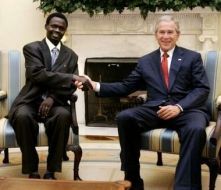Bush meets Darfur SLM rebel leader
July 25, 2006 (WASHINGTON) — Rebel leader Minni Minnawi’s decision to accept a peace agreement designed to end what the United States calls genocide in western Sudan has earned him an audience Tuesday with President George W. Bush.
 A major topic of discussion was sure to be Bush’s desire to bring African Union peacekeepers under the blue flag and helmets of the United Nations in Sudanese Liberation Movement leader Minnawi’s Darfur region.
A major topic of discussion was sure to be Bush’s desire to bring African Union peacekeepers under the blue flag and helmets of the United Nations in Sudanese Liberation Movement leader Minnawi’s Darfur region.
The focus of the meeting “will be on how to broaden support for the Darfur peace agreement, facilitate its implementation and ensure the expeditious deployment of U.N. peacekeepers to Darfur,” the White House said Monday.
Darfur has been wracked with violence since January 2003
Minnawi is the only major rebel leader to sign the May 5 agreement to end more than three years of carnage in Darfur, a massive desert area on Sudan’s border with Chad.
The loser in the power struggle, Abdulwahid Elnur, who still claims to head the Sudanese Liberation Movement, sent representatives to the negotiations but refused to sign the resulting document. So did Khalil Ibrahim, head of the more religion-based Justice and Equality Movement. Several others who broke away from Elnur’s followers and formed their own groups also rejected the agreement.
Although the agreement has held in some areas, signs of trouble have appeared. Two weeks ago at the United Nations, Jan Egeland, the U.N. humanitarian chief, said the region is facing a new wave of killings and rapes from fighting between rebel factions that displaced thousands of villagers. Egeland blamed Minnawi’s faction of the Sudanese Liberation Movement.
Minnawi said his forces were not involved in the upsurge of fighting and new atrocities.
Under the agreement, Minnawi will become senior assistant to the military president, Omar el-Bashir, which in turn would make Minnawi head of what will be the Darfur Authority. That administration would run Darfur as an autonomous part of Sudan once terms of the peace accord, including disarmament of all rebel groups, have been implemented.
The overwhelmingly negative reaction of the others to the agreement grew largely from its differences from the 2005 pact that ended an unrelated three-decade-long civil war in southern Sudan. The pact that ended that war made the main rebel leader president of southern Sudan and first vice president of Sudan. It also promised the southerners a referendum in six years to determine whether the region would become independent.
At about the time the southern war was winding down, the western trouble in Darfur was heating up. Decades of low-intensity fighting over land and water and resentment over what was seen as government neglect led to a general uprising, mainly of black African Muslims against the ethnic Arab Muslim government. The government responded by sending in horse-riding militiamen called janjaweed.
In the next three years, more than 180,000 people died from violence and famine and 2 million were made homeless.
The United Nations called it one of the world’s worst humanitarian disasters. The U.S. government declared it fit the legal definition of genocide.
(ST/AP)
